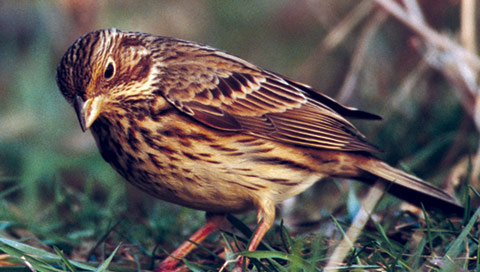Corn buntings Miliaria calandra have declined by a staggering 83% over the past twenty years, according to a new study of thirty sites in Aberdeenshire and Angus published in Bird Study, the journal of the British Trust for Ornithology. This once common farmland bird, known as the ‘fat bird of the barley’, has suffered as farming methods have intensified.
In Scotland, as few as 800 corn bunting territories remain, mostly in Aberdeenshire, Angus, Fife and the Uists. They were once abundant across the British Isles but since the 1970s have declined drastically because of changed cropping and intensive production methods. It is now a red-listed species in the UK, is extinct in Ireland, and is classified as “unfavourable conservation status” due to declines across Europe.
The new study, Decline of Corn Buntings on east Scottish study areas in 1989-2007, involved counts on 30 areas of farmland farms in Aberdeenshire and Angus annually between 1989 and 2007. Unfortunately this has revealed the depressing fortunes of the bird in what is still regarded as its Scottish ‘heartland’ – an overall decline of 83%, and the disappearance from all but four of the thirty areas by 2007.
Dr Adam Watson, who led the study together with RSPB Scotland scientists said: "When I began this study in 1989, I knew that corn buntings were already scarcer than when I saw them as an Aberdeenshire schoolboy in the 1940s, but thought they might hold their own in the strongholds that remained. Although it has been interesting to follow their numbers on the 30 areas, the huge decline has saddened and worried me. Many areas that held singing birds in the early years are now silent, as one local population after another went extinct. However, all is not yet lost and the government must urgently extend the targeted initiatives which have reversed declines on some farms, including one of my study areas."
In 2002, the Scottish Government, Scottish Natural Heritage and the RSPB began funding targeted management to encourage farmers to halt corn bunting declines through later mowing of grass meadows, reducing pesticide use, and providing winter seed food. Results showed that between 2002 and 2004, these measures were capable of halting declines in the areas where they were implemented, and deliver benefits for a range of farmland wildlife in addition to Corn Buntings.
However, since 2006 there has been a lack of money from the Scottish government for these ‘agri-environment’ schemes as the system was overhauled, while increases in grain prices and the end of an EU wide scheme to ‘set-aside’ a proportion of all farmland can only spell further trouble for the bird.
Professor Des Thompson, Policy and Advice Manager at Scottish Natural Heritage, said: “The decline of such a fascinating and popular bird is shocking; we now seem to have more corncrakes than corn buntings in Scotland. We know what is happening, and why, as a result of this superb work. We urgently need to find a way of offering real encouragement for the provision of habitats for these birds."
Hywel Maggs, Regional Farmland birds officer with RSPB Scotland said: “Farming in 21st century Scotland can be run at a profit whilst producing food and delivering conservation for birds like the corn bunting. The Scottish winner of the 2009 Nature of Farming award, John Moir, has seen corn bunting territories leap from 5 to 14 in just two years, by receiving a payment from the Scottish Government , RSPB and SNH for the kind of measures that we know work. The success of the corncrake recovery shows that well targeted measures can save a species for minimal cost, and we have been warning for some time that the same needs to be done for the corn bunting.”
“In the short term, a special project aimed at the farms where corn buntings still breed is essential, but we need an urgent replacement for the set-aside scheme, delivering equivalent benefits in well targeted areas. Ultimately, in addition to targeted agri-environment schemes, additional compulsory measures in cross compliance will be necessary to ensure a full range of public benefits are delivered by the public subsidies paid to farmers."
Source: RSPB, 18 July 2009
http://www.rspb.org.uk/news/details.asp?id=tcm:9-222741

- Log in to post comments
